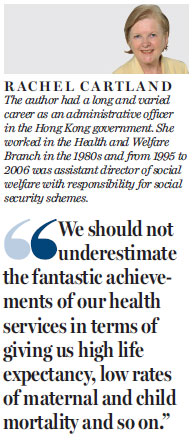HK can use its reserves to improve community's health
Updated: 2016-02-26 07:51
By Rachel Cartland(HK Edition)
|
|||||||
I am fortunate enough to have a busy life. In any downtime I turn to the Internet for enlightenment and entertainment, and usually ignore the television. The only exceptions I make are for the local news bulletin, and a British series with the title Call the Midwife. This is a drama set in a poor part of London beginning just after the National Health Service had been set up, bringing in a system of medical care free to all at the point of delivery to replace one which was essentially privatized with patients or their families having to pay for every treatment. Although it is fiction it reflects the reality of a terrible burden of anxiety being lifted.
Worrying about what might happen if we fall ill is surely a universal emotion. In the days when I had plenty of opportunities to chat to elderly CSSA (Comprehensive Social Security Assistance) recipients I found that this was the topic that came up over and over again. The entitlement that comes with CSSA to exemption from all charges levied by the Hospital Authority system is regarded as one of the greatest benefits of being a social security recipient and many had tales of life saving surgery and follow up medication received. Incidentally, trust in the reliability of Hong Kong's medical services was a major factor in deterring the elderly from entering schemes for portable CSSA that would allow them to continue to receive benefits while living on the mainland.
There was another side to the coin though; others were still troubled particularly about the problem of getting access to these services since the wait for an appointment at a specialist clinic is often so long. It is not, of course, just the elderly who will have particularly acute concerns. Shortage of appropriate professionals means that those with mental illness suffer and parents of children with disabilities can face an uphill struggle to obtain the assistance that they need.
It is worth bearing in mind, too, that one can have a different perspective on public medical services depending on your address and income level. Things can look rosy if you have access to Queen Mary Hospital and have the income and status that allow you to easily take time off for medical appointments, to have an expectation that you will be granted sick leave and also to supplement with private sector treatment if necessary. It is a different story if, like the bulk of the population, you live in the crowded estates in the New Territories, may well not have an understanding employer nor the means to "go private" in order to speed things up.
Of course, we should not underestimate the fantastic achievements of our health services in terms of giving us high life expectancy, low rates of maternal and child mortality and so on. All the same, can we not do better and offer a really decent service to all Hong Kong's citizens? In this connection, it is encouraging to see what was set out in the recent Policy Address. Major increases are promised in numbers of hospital beds, operating theatres, day care sessions and training places for doctors.
Secretary for Food and Health Ko Wing-man has also made a worthwhile decision to stop emphasizing Hong Kong's potential as a center for medical tourism which will mean that resources can be concentrated on the needs of our own population. In addition, the discussion on a possible health insurance scheme has become more muted and that is surely sensible. Over many years much effort has been spent on trying to come up with a workable scheme, but so far to no avail and, that being so, all that energy might better go toward the not-so-simple task of planning to provide services that are most appropriate to the needs of our community.
So what has been announced is good but should it not go further? Wouldn't it be commendable to announce some really bold targets such as cutting the waiting times for basic operations like cataract repair or for appointments with consultants or diagnostic tests? Of course it would be expensive; the already announced hospital construction projects alone will cost an estimated HK$200 billion. We should not recklessly splash money around but, let's face it, we can afford to do even more. In his illuminating recent commentary in the South China Morning Post, Richard Harris pointed out that tiny Hong Kong currently has consolidated government reserves of an estimated HK$1.57 trillion, a sum which continues to grow. What better use could they be put to than to give our community the greatest gift of all, the gift of good health?

(HK Edition 02/26/2016 page10)